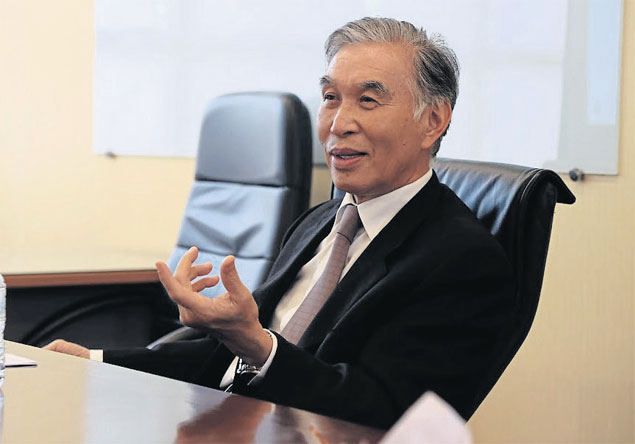
Isara Vongkusolkit, chairman of the Thai Chamber of Commerce, sees his task as far from done.
The chairman of Mitr Phol Group, Thailand's leading sugar-cane business, who was re-elected chairman of TCC last Thursday for another two years, remains enthusiastic about his vision of enhancing the competency of Thai companies, particularly small and medium-sized enterprises in the provinces, through partnership with the Small and Medium Enterprise Development Bank of Thailand (SME Bank).
"Developing Thailand's competitiveness is a must even though the country's global ranking improved last year," he says.
"The country still has a lot of facets to improve, be it education, skilled labour, public services, ways of doing business, infrastructure and technology or innovation."
The Global Competitiveness Report 2014-2015 of the World Economic Forum saw Thailand advance six places to 31st despite its prolonged political crisis. Thailand gradually moved up from 39th in 2011-2012 to 38th and 37th in subsequent years.
The ranking is based on 12 factors, and the country scored well on infrastructure, macroeconomic environment and workforce efficiency.
However, Thailand had weak scores on innovation, political governance and intellectual property laws that prevented it from being ranked higher.
Singapore grabbed the No.2 spot in world competitiveness, while Malaysia, Indonesia, and the Philippines placed 20th, 34th and 52nd respectively.
Mr Isara says Thailand needs to upgrade to become a trading nation, raise productivity in the farm sector, use agricultural zoning and apply more technology to cut production costs.
The service sector should focus on developing the tourism, digital and creative economy, wellness service, design and construction and property segments, he says.
As regional economic integration inches closer, Mr Isara believes it is essential to underline connectivity and collaboration not only domestically but also regionally and globally.
The TCC under his helm is committed to continuing the development of networks among foreign and Thai chambers in the provinces as well as with foreign ambassadors.
Collaboration between the private sector and state agencies such as the ministries needs to be underlined, he said.
Mr Isara says the TCC will continue its initiative where big, experienced local companies function as mentors to small Thai enterprises to help them tap into more exports. The TCC teamed up with the Commerce Ministry earlier this year to launch the "elder brothers/sisters lead the younger ones by the hand" scheme where leading firms with experience in exports provide knowledge, develop proactive marketing strategies, and take study trips to potential markets such as China, Asean and Europe with SMEs.
The scheme is slated to start in March and aims to cover 500 Thai SMEs this year.
He also highlighted good governance and corporate social responsibility as vital. The TCC is teaming up with non-profit organisations, civil networks and the government to launch the Inspiring Thailand scheme, which deals with these issues.
"What we need most right now is inspiration," Mr Isara says.
"We have to change the mindset, work closer together to bring the country out of this difficult spot and ensure political stability in the long run."